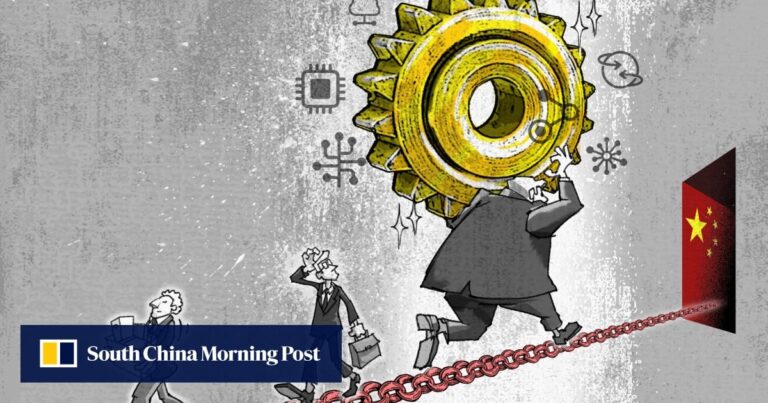“We remain confident about the outlook for our China business,” said Zhao Gang, general manager of the German company’s Suzhou operations.
The family-run multinational is one of a number of European companies, particularly leading German manufacturers, that continue to do business with China amid escalating trade tensions between China and the European Union and a backdrop of wider decoupling efforts.
Zhao praised China’s investment environment, saying local governments are “very supportive” of foreign companies, while the growth potential of the huge market is a big reason for his company’s optimistic outlook.
The company has seven assembly plants in the Asia-Pacific region, including Japan, South Korea and Australia, but combined sales in those regions account for less than 20% of its China business’s sales, he noted.
Joining SEW in its expanding presence in China is Zeiss, a German lens manufacturer and world leader in optics and optoelectronics.
The multinational company opened a new manufacturing facility in Suzhou on July 8, according to the Suzhou Daily, marking its third base in China after Shanghai and Guangzhou.
This marks Zeiss’s “further localization in China and the improvement of local R&D and manufacturing capabilities,” the report said.
Direct investment by German companies in China rose 4.3 percent last year to a record 11.9 billion euros ($13 billion), despite the German government’s calls for it to reduce investment, Reuters reported in February, citing a study by the Institute for Economic Research (IW) based on official data from the German Bundesbank.
According to a private economic research institute, total investment by German companies in China over the past three years is equivalent to the amount invested in the previous six years.
This comes as European businesses have shown waning enthusiasm in recent years as the region struggles to balance avoiding risks from China while cooperating with it.
According to the annual FDI Statistics Bulletin released by the Ministry of Commerce of China, the share of EU investment in China’s total foreign direct investment (FDI) will decrease from 7.5% in 2018 to 5.3% in 2022.
We are increasingly purchasing from local suppliers, with the proportion growing every year.
Price pressures due to fierce competition from a growing number of Chinese companies are the most widely shared concern among German companies operating in China, according to a business confidence survey released last month by the Chinese-German Chamber of Commerce and Industry (AHK Greater China).
In response to this issue, SEW’s Zhao said the company is “bringing cutting-edge technology and products to China” and intends to continue winning in the Chinese market.
The company’s sales to third-party buyers in China exceeded 10 billion yuan (US$1.4 billion) in 2021 and have experienced “steady growth” since then, he added.
Some 53% of companies doing business in China plan to increase their investment over the next two years, according to the AHK survey, down from 61% when the same question was asked last year.
This included Phoenix Contact China, another German-based global leader in the field of industrial automation.
The company plans to start construction of a new logistics center in Nanjing, Jiangsu province, in the first half of next year to mainly serve local customers, said Jiang Shimin, vice president of the company.
Buying and manufacturing locally to cater to the local market has been a key strategy for the company, he said.
“We are increasingly buying from local suppliers and the percentage is growing every year,” he said.
Efforts by the Chinese government to attract foreign investment, such as expanding market access and easing visa policies, since China’s borders reopened in early 2023 have also been paying off to some extent, according to Benoit Ikerif, deputy general manager of the Nanjing-based China division of Danish logistics company DSV.
Three years of the pandemic “have not been easy” but “we are still here and we remain focused on China,” he said.
A key factor, he said, is that the company “has very good communication with the authorities here. They have been very flexible and have come to Sweden after the pandemic.”
Winning back foreign investors has been a key economic theme over the past year as China struggles to keep gross domestic product growth at around 5 percent amid sluggish investor and consumer confidence.
The Chinese government stressed its openness to foreign companies, promising to ensure 100 percent access to manufacturing and remove further restrictions in the services sector.
At a July 1 conference on ways to attract more foreign investment, Chinese Vice Premier He Lifeng acknowledged that China’s appeal to foreign companies lies in its huge market, but urged authorities to turn that into “concrete advantages in attracting investment.”
China attracted 498.9 billion yuan worth of FDI in the first half of this year, down more than 29 percent compared with the same period in 2023, according to Commerce Ministry data.
However, recently released figures showed that the number of newly registered foreign companies in the same period increased by 14 percent compared to the previous year.
Chen Fengying, a researcher at the China Institutes of Contemporary International Relations, a Beijing think tank, said there was still room for economic cooperation between the EU and China despite recent trade frictions over Chinese new energy products.
Unlike the United States, which has become “more nationalistic and closed,” Europe remains open, she said.
“Europe is no longer on an equal footing with the United States in the world order we currently face. Ideological aside, our conflicts are not as great as those with the United States,” she said.
But risk aversion remains a concern among European companies, she said, adding that most new foreign investment is small and backed by overseas Chinese.
Foreign companies operating in China point to a series of challenges to continuing to do business in the country, including an uncertain regulatory environment, an uneven playing field in competing with domestic companies, and geopolitical turmoil between China and its Western trading partners.
In contrast to the optimistic stance of German manufacturers, there has been an overall surge in European companies that have undergone a “decoupling” of their headquarters and Chinese operations over the past two years, causing a “slowdown in existing business and a reduced ability to take advantage of new projects and investment plans” in China, according to a report published in May by the EU Chamber of Commerce in China.
It has also been pointed out that the trend towards decoupling is due to the decline in the number of Europeans employed at Chinese companies, which has led to a loss of mutual understanding and trust.


